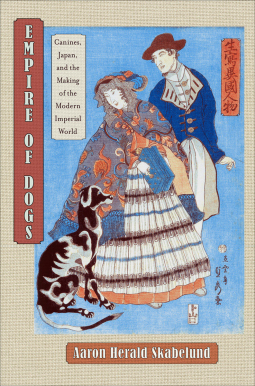
Empire of Dogs
Canines, Japan, and the Making of the Modern Imperial World
by Aaron Skabelund
This title was previously available on NetGalley and is now archived.
Send NetGalley books directly to your Kindle or Kindle app
1
To read on a Kindle or Kindle app, please add kindle@netgalley.com as an approved email address to receive files in your Amazon account. Click here for step-by-step instructions.
2
Also find your Kindle email address within your Amazon account, and enter it here.
Pub Date Nov 10 2011 | Archive Date Sep 01 2012
Description
In 1924, Professor Ueno Eizaburo of Tokyo Imperial University adopted an Akita puppy he named Hachiko. Each evening Hachiko greeted Ueno on his return to Shibuya Station. In May 1925 Ueno died while giving a lecture. Every day for over nine years the Akita waited at Shibuya Station, eventually becoming nationally and even internationally famous for his purported loyalty. A year before his death in 1935, the city of Tokyo erected a statue of Hachiko outside the station. The story of Hachiko reveals much about the place of dogs in Japan's cultural imagination.
In the groundbreaking Empire of Dogs, Aaron Herald Skabelund examines the history and cultural significance of dogs in nineteenth- and twentieth-century Japan, beginning with the arrival of Western dog breeds and new modes of dog keeping, which spread throughout the world with Western imperialism. He highlights how dogs joined with humans to create the modern imperial world and how, in turn, imperialism shaped dogs' bodies and their relationship with humans through its impact on dog-breeding and dog-keeping practices that pervade much of the world today.
In a book that is both enlightening and entertaining, Skabelund focuses on actual and metaphorical dogs in a variety of contexts: the rhetorical pairing of the Western "colonial dog" with native canines; subsequent campaigns against indigenous canines in the imperial realm; the creation, maintenance, and in some cases restoration of Japanese dog breeds, including the Shiba Inu; the mobilization of military dogs, both real and fictional; and the emergence of Japan as a "pet superpower" in the second half of the twentieth century. Through this provocative account, Skabelund demonstrates how animals generally and canines specifically have contributed to the creation of our shared history, and how certain dogs have subtly influenced how that history is told. Generously illustrated with both color and black-and-white images, Empire of Dogs shows that human-canine relations often expose how people—especially those with power and wealth—use animals to define, regulate, and enforce political and social boundaries between themselves and other humans, especially in imperial contexts.
Advance Praise
"In this engagingly written book, Aaron Herald Skabelund explores the range of roles played by domestic dogs in imperializing, imperial, and postimperial Japan. His work resonates with recent historical scholarship on pets in western societies, and, as a result of its very different geographical focus, offers a challenging new perspective."—Harriet Ritvo, Arthur J. Conner Professor of History, MIT
"Empire of Dogs is masterfully researched, lucidly narrated, and beautifully illustrated. I caught myself trying to anticipate the historical delights that might be hiding on the next page, but I proved completely unable to do so. For the reader who doubts that dogs are artifacts of the past and important historical topics—not simply reflections of human experiences, but creators of them—this wonderful book will win over those doubters. Whether Japan's dogs serve as symbols of imperial violence, messengers in Manchurian battlefields, companions in middle-class living rooms, or peddlers of electrical appliances, they walk through Japan’s modern experience at every level."—Brett L. Walker, Regents Professor of History, Montana State University, author of The Last Wolves of Japan and Toxic Archipelago: A History of Industrial Disease in Japan
"Empire of Dogs envisions the rich and strange history of Japan’s rapid twentieth-century transformation from an object of Western imperialism to a formidable imperial subject through a startlingly familiar lens: the domesticated dog. From this angle, Aaron Herald Skabelund’s insightful analysis illuminates the historical links between modern imperialism and animal practices, and along the way demonstrates that historiography stands to benefit from closer attention to the companionship and other configurations of these global creatures.”—Susan McHugh, University of New England, author of Dog and Animal Stories: Narrating across Species Lines
"Empire of Dogs demonstrates the continued symbiotic relationship between humans and canines that stretches back to Paleolithic times and places this relationship within the key political contexts of modernity: nationalism, imperialism, and globalization. This book is the perfect example of the value of animal studies to the practice of history."—Kathleen Kete, Borden W. Painter, ’58/H ’95 Associate Professor of European History, Trinity College
Available Editions
| EDITION | Other Format |
| ISBN | 9780801450259 |
| PRICE | $43.95 (USD) |
| PAGES | 288 |



